
To be completely upfront, defensive consumer stocks tend to be incredibly boring. With these ideas, you’re almost giving up any practical intentions of robustly beating the market. Instead, you’re hoping to stay in the game and live to fight another day. It’s not appealing, but the strategy can be very effective, depending on the circumstances.
That’s especially true if the circumstances we’re dealing with is a possible economic downturn. While I certainly don’t want to intentionally promote a doom-and-gloom narrative, it would be wrong to dismiss the idea entirely. For example, the U.K. is facing elevated recession risks, as is the broader European region. Also, Japan’s economy is contracting, raising concerns.
True, these are other countries. However, because the global economy has become so interconnected, it’s difficult for any one nation to be fully insulated. Besides, American households already suffer from stubbornly high inflation and simultaneously high borrowing costs.
Now, that doesn’t mean consumer defensive stocks represent a perfect panacea. But if you want to stay in the market during these (potential) troubles, the below ideas offer much confidence.
Ross Stores (ROST)
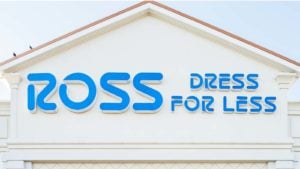
Now, before you blast me by pointing out that Ross Stores (NASDAQ:ROST) generally falls under the discretionary sector, I also believe it more than tangentially crosses paths with the traditional defensive consumer stocks. Yes, Ross is where you go to find designer brands at discounted rates. Still, with society actively normalizing, the company will likely rise in relevance.
As a relatively recent CNBC article pointed out, the “golden age” of remote work may be coming to an end. If more people are coming back to the office, they’ll likely require an upgrade in the business wardrobe department. Also, not to be rude but we can’t forget that a lot of folks gained unwanted weight during the crisis. So, it’s possible that the wardrobe upgrade represents a matter of necessity.
Whatever the reason, the market loves ROST right now, a possible scenario I warned about last month; warned, that is, for bears interested in shorting ROST. With analysts rating shares a strong buy, I think Ross may have some legs left.
Kraft Heinz (KHC)
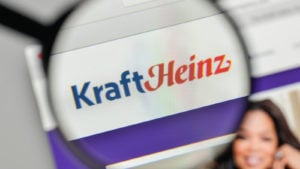
A multinational food company, Kraft Heinz (NASDAQ:KHC) makes for a traditional case for defensive consumer stocks to buy. As an added bonus, KHC represents one of the top Warren Buffett stocks to consider. Since the Oracle of Omaha knows a thing or two about navigating various economic cycles, his indirect endorsement of KHC helps instill confidence.
However, it’s a riskier enterprise among defensive consumer stocks due to the present volatility. Since the start of the year, KHC gave up more than 14% of equity value. Of course, that’s not comforting. Still, on the other end of the aisle, KHC stormed almost 9% higher in the trailing one-month period. Undergirding sentiment was the company’s third-quarter earnings report, which saw Kraft Heinz beat per-share profitability estimates.
Also, management raised its adjusted EBITDA guidance, lifting investors’ opinion on KHC. It’s worth pointing out that the company offers a robust forward dividend yield of 4.58%. Analysts peg shares a moderate buy with a $36.65 average price target.
Procter & Gamble (PG)
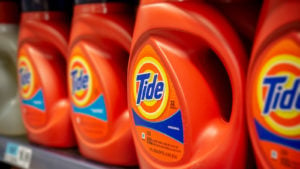
An oldie but a goodie when it comes to defensive consumer stocks, Procter & Gamble (NYSE:PG) is about as inoffensive of an investment as you can get. When you think about it, some of the most alluring growth stories materialized because they were audacious; they ticked people off. Indeed, in the market and in life, you’ve got to be willing to be offensive to stand a chance of shining.
Whatever you think about this narrative, that’s not happening with P&G. As a manufacturer of various household goods, the company doesn’t want you to think too much about it. Rather, its main job is to present an attractive, trusted brand that you keep coming back to over and over. It’s hardly a recipe for spiciness but it gets the job done.
Financially, P&G’s not remarkable: just keep the nose clean with consistent profitability. In turn, the company offers a forward yield of 2.49%. As well, analysts rate shares a moderate buy with a $164.24 average price target.
Mondelez (MDLZ)
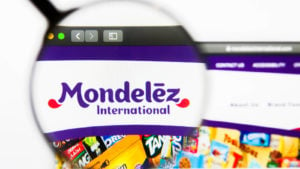
A multinational confectionary company, Mondelez (NASDAQ:MDLZ) provides a diverse look for its underlying business. In addition to the sweet stuff, the company specializes in food, beverage and snacks. However, it’s probably best known for the brands that send you to the dentist’s office. For example, the company owns Oreo and Chips Ahoy!, among other delectable goodies.
Fundamentally, MDLZ ranks among the top defensive consumer stocks because of the trade-down effect. As you know, sugar and caffeine represent two of the most commonly used substances in Western nations. Frankly, a lot of us need these two vices to help us through the nine-to-five grind. During bull markets, it’s easier to justify going to coffee shops and eateries to have your fill.
However, during economic downturns, those same people may turn to the grocery aisles. That’s where Mondelez does its business. Thanks to the company’s consistent profitability, it pays out a forward yield of 2.37%. Also, analysts dig it, pegging shares a strong buy with a $78.67 price target.
Nestle (NSRGF)

Although trading in the over-the-counter market, Nestle (OTCMKTS:NSRGF) deserves consideration for defensive consumer stocks to buy. As one of the food and beverage powerhouses, Nestle commands a strong global presence. Among its popular brands are Nespresso, Nescafé, Kit Kat, Smarties, Nesquik, and Stouffer’s, to name but a few. Also, it specializes in other sectors, such as baby, medical, and pet food products.
Though exceptionally relevant, Nestle shares have admittedly been all over the map. Undulating throughout this year, NSRGF presently sits about 2% below parity for the year. However, it’s attempting to make a comeback. In the trailing one-month period, it returned stakeholders nearly 4% of equity value.
To be fair, NSRGF isn’t exactly a discount, trading at 27.72x trailing-year earnings. In contrast, the sector median comes in at 18.95x. Nevertheless, it enjoys a long history of robust earnings going back to at least 2008. Also, its revenue picked up significantly last year. Analysts also rate shares a moderate buy with a $131.36 price target, implying over 15% growth.
Kroger (KR)
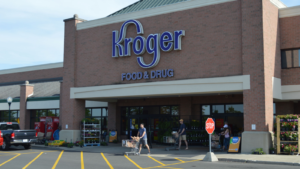
Arguably a no-brainer among defensive consumer stocks, Kroger (NYSE:KR) represents a grocery stalwart. As such, it’s hardly a sexy enterprise. When you acquire shares of KR, you’re not necessarily doing so to get rich quick. Rather, you’re banking on a consistent revenue and earnings stream. No matter who you are, you’re going to require the essentials.
To be fair, though, KR hasn’t excited investors even with the permanently relevant narrative. Since the start of the year, the security slipped almost 1% below parity. Nevertheless, the red ink also makes for an intriguing discounted opportunity. Right now, shares trade hands at only 9.79x forward earnings. For context, the underlying retail defensive sector features a median forward earnings multiple of 14.47x.
It also trades at a discount relative to trailing-year revenue. As an added bonus, Kroger offers a forward yield of 2.63%, along with a payout ratio of 26.45%. Therefore, investors shouldn’t have to worry too much about yield sustainability.
Lastly, analysts peg KR a moderate buy with a $52.75 target, projecting over 19% upside.
Archer Daniels Midland (ADM)

On paper, Archer Daniels Midland (NYSE:ADM) appears one of the most relevant ideas for defensive consumer stocks. While the food processing and commodities trading firm doesn’t directly interface with consumers, its offerings undergird myriad consumer brands. Indeed, we wouldn’t be able to talk about the subject of consumer defensive ideas without ADM and its ilk.
Unfortunately, relevance alone hasn’t exactly helped Archer Daniels Midland. Since the start of the year, ADM lost more than 17% of equity value. In the past 52 weeks, it slipped almost 24%. To be sure, its Q3 earnings report didn’t help the fundamental narrative. While the company’s profit beat on ethanol margins, certain key segments lagged expectations, per Reuters.
Still, for the contrarians, ADM could be appealing. Right now, shares trade at 11.07x forward earnings, below the sector median of 15.3x. In addition, the business is consistently profitable, leading to a forward yield of 2.42%. Also, the company has enjoyed 50 years of consecutive dividend increases.
Finally, analysts rate ADM a moderate buy with a $92.83 price target, implying 25% growth.
On the date of publication, Josh Enomoto did not have (either directly or indirectly) any positions in the securities mentioned in this article. The opinions expressed in this article are those of the writer, subject to the InvestorPlace.com Publishing Guidelines.







